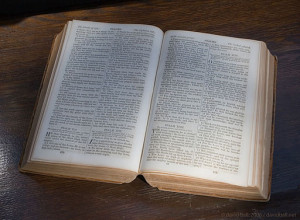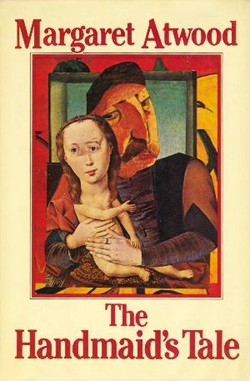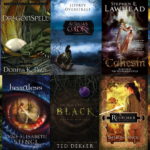Looking For A Few Good Words
I’m choosy about books. I’m not so particular about genre, but I’m a terrible snob where the quality of writing is concerned. I want some depth to a story. A satisfaction of the spirit.
I’m less concerned with a story’s action than I am with the action of the language. The words I’m looking for should be overachievers; not content to merely tell a tale, they should also evoke a feeling, provoke an unexpected thought, drill a subtext. I want to read phrases that sing, sentences that paint pictures, paragraphs that resonate like a tympani roll.
Not surprisingly, I don’t often find what I’m looking for. A few weeks ago, however, I discovered the speculative classic (1985) The Handmaid’s Tale by Margaret Atwood. Based on what I see in this novel, Ms. Atwood knows how to use words.
Handmaid’s Tale by Margaret Atwood. Based on what I see in this novel, Ms. Atwood knows how to use words.
I especially appreciated the opening paragraphs of the chapters. They set the mood, wrapping me in a blanket of delight as they urged me to keep reading. For an example, take a look at the first paragraph of Chapter 2:
A chair, a table, a lamp. Above, on the white ceiling a relief ornament in the shape of a wreath, and in the center of it a blank space, plastered over, like the place in a face where the eye has been taken out. There must been a chandelier, once. They’ve removed anything you could tie a rope to.
The opening of chapter 4 is is pregnant with meaning you won’t understand apart from knowing the story, but even at face value, it’s wonderful imagery:
I walk along the gravel path that divides the back lawn, neatly, like a hair parting. It has rained during the night; the grass to either side is damp, the air humid. Here and there are worms, evidence of the fertility of the soil, caught by the sun, half dead; flexible and pink, like lips.
This is seriously good writing, and I enjoyed every second I spent reading it. But you know what? I didn’t particularly like the story. I can see where Ms. Atwood was coming from, but the scenario the book portrays seems a little unlikely.
Perhaps it would have been easier to swallow at the time she wrote it, which was, I suppose, the heyday of the “Christian Right.” But in retrospect, it’s hard to see how this story world could ever be taken seriously. Ultraconservative pseudo-Christians running the country according to a warped version of biblical law? Are you kidding?
In case you’re not familiar with it, here’s the gist of the situation: environmental toxins have caused humankind’s fertility to falter. Women who can conceive and bear children—whole, unblemished children—are a rare commodity. In the midst of this crisis, a Fundamentalist group (I guess that’s what it’s supposed to be) takes over the US and reorganizes society according to their own warped ideas.
I would say their policies are based on the scriptures, but they’re not; perhaps inspired by the scriptures would be a better description, because they take verses and concepts from the Bible and twist them to mean things God never intended.
Under this new order, fertile women serve as “handmaids” to men in the higher echelon. The sole function of this class of females is to procreate, and they have been trained in the proper (supposedly biblical) way to be a vessel for this purpose. The story, as you can guess from the title, is the biography of one such handmaid.
Apart from the basic incongruity of fundamentalist Christians taking power in the US (especially with the initial support of the majority of the citizens), I had a quibble with a couple other aspects of the tale. The first thing I stumbled over was the protagonist’s recollection of when the takeover began: after they shot the president and gunned down the Congress, the army declared a state of emergency and told everyone to be calm, everything’s under control. Then they suspended the Constitution. And there was no reaction from the people. In the protagonist’s words, “People stayed home at night, watching television, looking for some direction. There wasn’t even an enemy you could put your finger on.”
I’m willing to suspend a good bit of disbelief when reading fiction, but I had a hard time getting past that one.
Another thing I had trouble with was the final chapter, where another narrator comes on the scene and explains that all of what we just read was a diary found in a trunk somewhere, and nobody knows if it’s an actual account or a fictional story. In my opinion, the book would have been much stronger without that last chapter, called “Historical Notes on The Handmaid’s Tale.”
Otherwise, Ms. Atwood’s story world was carefully thought out and believable. The multi-dimensional world was faultlessly consistent with itself and full of realistic details, all portrayed with delightful artistry. But I can’t help wondering if the author truly believed the aberrations she described are logical extensions of biblical faith.
Any reader can see the wrongness of the belief systems of this fictional government. But nowhere do we see any attempt to counter the lies with truth. It seems to give the impression that the scriptures, if taken literally, are a danger to civilization, and they should be shunned by all thinking people.
counter the lies with truth. It seems to give the impression that the scriptures, if taken literally, are a danger to civilization, and they should be shunned by all thinking people.
It saddens me to see such a misconception so skillfully portrayed. What literature of similar quality shows the other side of the coin? Are there similarly well-written stories that reveal an accurate understanding of scriptural truth?
I’m not saying these stories don’t exist; only that I don’t know of them.
I freely admit that my literary knowledge, particularly in the world of Christian speculative fiction, is limited. But in my fumbling explorations, I’d love to stumble across a book with language that makes me grin, as this one does, but tells a story that makes me want to shout, “Amen!”
I’m not talking about allegory, either. I mean a realistic tale with believable characters who love God’s truth and live like they believes it. A book written by a person who loves words and knows how to get the most from each one. The unbelieving world doesn’t have an exclusive claim on dynamic writers, does it?
For anyone reading this who’s written just such a novel, I apologize; my ignorance is glaring. You see, I’m a newcomer to the speculative world and I have a lot of catching up to do. (This is why I’m just now reading these classics for the first time). But I’m willing to investigate any suggestions.








































Try Gilead by Marilynne Robinson. Like in Tolkien’s work, her faith reflects through the interstices of the story, and her prose is both subtle and polysemous.
That’s already on my TBR list, but I’m move it to the top. Thank you!
So sorry for your experience with the Handmaid’s Tale. It sounds like a very calculated attack on truth, as you said. And the ending certainly implies “Thank goodness we got rid of those horrible fundamentalists and everything’s better now”. You are right. There are very few lyrical modern writers. I belong to some writer groups that actually discourage it. They keep trying to pare off “waste”, when sometimes it might be beauty. I wish I knew the answer. Many modern authors I read have a story, but it’s told clumsily.
Read the Dorothy Dunnett “Lymond Chronicles.” She tells a brilliant story with brilliant writing about a brilliant character you will love and hate simultaneously, told from the point of view of a character you will just love.
Also, as an added bonus, the books are from years of deep research into 1500s Europe. And Francis Crawford of Lymond is a brilliant Scottish outlaw and political mastermind. Who talks in poetry. Because he can. And because it annoys the dickens out of the various conspirators and kingmakers he rubs shoulders with.
http://en.wikipedia.org/wiki/Lymond_Chronicles
I second that suggestion!
Have you read them then?
Yes. I first discovered them when they were coming out in the late sixties and early seventies; I sat up all night reading Pawn in Frankincense the hot summer of 1977, I recollect. It is one of the few series–like Lord of the Rings–that I think holds up in later reading. Be warned, though: the violence is unflinching. I also think the second one, Queen’s Play, the least successful, but the last three are terrific. And the worldview isn’t a pinched, aren’t-I-proud-to-be-nihilist, as I find in Atwood, whose prose is so lovely, but her paradigm is as subtle as a hammer to the head.
You…. read them …. when they were coming out….. meaning, you had to WAIT for each one….. how are you still sane? 😀
Well, yes and no. I read the first in 1970, thought it was a stand-alone with a peculiar end. Discovered when I got to London a year later that the fourth was just coming out there, but in hardback, which I (impoverished student, living on fifty cents a day) could not afford. When I got back from my year of study I was buried in grad school and pretty much gave up fiction, but caught up with some friends in the mid-seventies who had been reading the series. At that time Checkmate was not yet out. One friend begged me to wait, said that really, I’d thank her, and as soon as the last came out she’d loan me the entire set.
Put it this way. I thanked her profusely every time I saw her for about two years afterward!
I’ve added this to my list as well — sounds intriguing! Thank you!
P.D. James The Children of Men is probably the closest reply to Atwood. The book’s Catholic themes are latent, but it’s far more plausible an apocalypse and seems startlingly prescient. I’d recommend for you personally Yvonne Zenna Henderson’s The People books, which are about an alien race that migrates to earth.
Thank you for the suggestions. I’m particularly excited to read the work of someone named Yvonne Henderson! I appreciate your input.
Oh, wait — I see the author is Zenna Henderson, not Yvonne. That’s okay, I’ll check her out anyway.
I’ve a feeling I read somewhere that she was not specifically implying that this kind of society was a natural outworking of Christianity – but of oppressive fundamentalism (which we would reject as much as anyone else). I think some of it was also based on the fact that this kind of backward step actually has happened in real life, such as under the Taliban. Women in places like Afghanistan used to have freedom that was then taken away. Because this book was set in America, it was natural that there should be some kind of pseudo-christianity behind it.
Of course, that doesn’t mean that it may not (intentionally or otherwise) prejudice people against Christianity.
Children of Men is a very interesting, very disturbing look at what a drastic drop in fertility would mean. I highly recommend it.
I recommend The Little White Horse and Linnets and Valariens by Elizabeth Goudge. Both childrens’ fantasy, heavily inspired Rowling (you can spot places she paid tribute to, like the owl in Valariens, or the character Tom Biddle.) Wonderful books with just such a beautiful use of language. If you don’t mind contemporary, her adult novels are just as wonderful. I just read the Scent of Water and I want to buy it.
Thanks, Kessie — I have no problem with contemporary nor kids’ books. I’ve never heard of Elizabeth Goudge before, but it looks like I should make her acquaintance (or at least, acquaint myself with her writing). I appreciate the suggestion.
I have the same problem with suspension of disbelief with a lot of dystopian literature. There are, however, portions of Christianity, like Quiverfull and some Baptists, that emphasize gender difference and roles and suchlike to a blatantly misogynistic extent, and from those it isn’t too far a jump to “Biblically” Supported Misogyny-Land (though it is dubious as to whether the populace at large would ever let them do it [help me, suspension of disbelief, you’re my only hope]).
From what I’ve heard of discussion about “The Handmaid’s Tale,” it’s less about Christianity and more about how people will twist religion/ideology to gain power and privilege and how the populace would go along with it if they’re fearful/passive enough. Also, misogyny is bad. If you walked away from the book not knowing that, there’s no helping you. And the meta-chapter at the end is apparently supposed to be a critical lampshade on the world of academia.
I think “The Handmaid’s Tale” is worth reading, so I need to go put my money where my mouth is and actually read it myself.
I think that’s more or less what I was trying to say, but you said it better.
I wouldn’t be so sure about the populace at large not falling for it. Populaces at large fall for some crazy things (Hiltler was democratically elected), and if the people who take over somehow get financial power (in this book they managed to freeze all women’s bank accounts) or use force what can you do?
True, Kirsty, it’s hard for us to imagine today how any populace could elect a Hitler. Of course hindsight tells us what was happening, while at the time, the voters couldn’t see the future. I think sometimes the same thing plays out in dystopian novels. An author sees a situation and speculates about a what-if-scenario. If history takes a different turn, then later on, the idea seems ridiculous, even if there was at one time sufficient evidence to suggest it was possible.
Being a Bible-believer, I tend to get a bit ruffled when people try to twist scripture to support their own ideas, which is what the people did in The Handmaid’s Tale. But I think you’re right, Notleia, in saying “it’s less about Christianity and more about how people will twist religion/ideology to gain power and privilege and how the populace would go along with it if they’re fearful/passive enough.” That point came across powerfully. Though I don’t believe it’s accurate to put biblical Christianity on the same plane as religion/ideology, I suppose that’s a subject for another discussion.
Taliesin and Merlin by Stephen Lawhead.
Not the same style as Atwood but I think the language is breathtaking.
I’ll second that! I love all his Pendragon books.
Never did read Atwood . . . a professor of mine put it on her recommended summer reading list with a blurb like “shockingly realistic portrayal of what would happen if the Right came into control” . .. Was enough to put me off!
I third the motion. Merlin is one of my favorite works of fantasy, and, I think, the best thing Lawhead’s ever written. (Unfortunately, the greatness thereof pushed Arthur, third installment in the Pendragon Cycle, over the cliff of my raised expectations.)
But to bait this hook, Yvonne, I will now quote from memory the trilogy’s opening lines:
Ten rings there are, and nine gold torcs,
On the battle-chiefs of old.
Eight princely virtues, and seven sins,
For which a soul is sold.
Six is the number of Earth and Sky,
Of all things meek and bold.
Five the number of ships that sailed
From Atlantis lost and cold.
Four kings of the Westerlands were saved;
Three kingdoms now behold.
Two came together in love and fear
In Lyonesse stronghold.
One world there is, one God, and one birth
The druid stars foretold.
I’ll have to try that one. I’m interested now.
I’ve read some Lawhead, and enjoyed it. I have Taliesin sitting on my shelf but haven’t read it yet. Thanks, Leanna!
Most of the time I take it for granted that people have read This Present Darkness by Peretti. I’m realizing more and more that I shouldn’t. It stands beside Lewis’ Space Trilogy as one of the greatest works of Christian speculative fiction, equal in quality to the cream of the secular market.
Ehhhhhhhh, I was pretty underwhelmed by This Present Darkness. Peretti just ain’t all that subtle. The demons try to tempt the pastor dude, cue walking stereotype of a red-dress-wearing, purrs-as-she-talks seductress who might as well have “HOOKER” stamped across her forehead. It hurt to read, mostly because I facepalmed harder than I meant to.
I hope that didn’t leave a mark. Overzealous facepalms can be just as bad as forehead-stamps. ;-p
And this may shock you, but it don’t usually take much subtlety to tempt a man.
You might want to read Charles Williams’s Descent into Hell. He’s not one of my favorite authors, but if you want subtlety and symbolism in spiritual fiction, he’s a good bet. Unfortunately spiritual warfare fiction in general tends to not like ambiguity or subtlety.
Not a fan of Peretti, nor spiritual warfare in fiction.